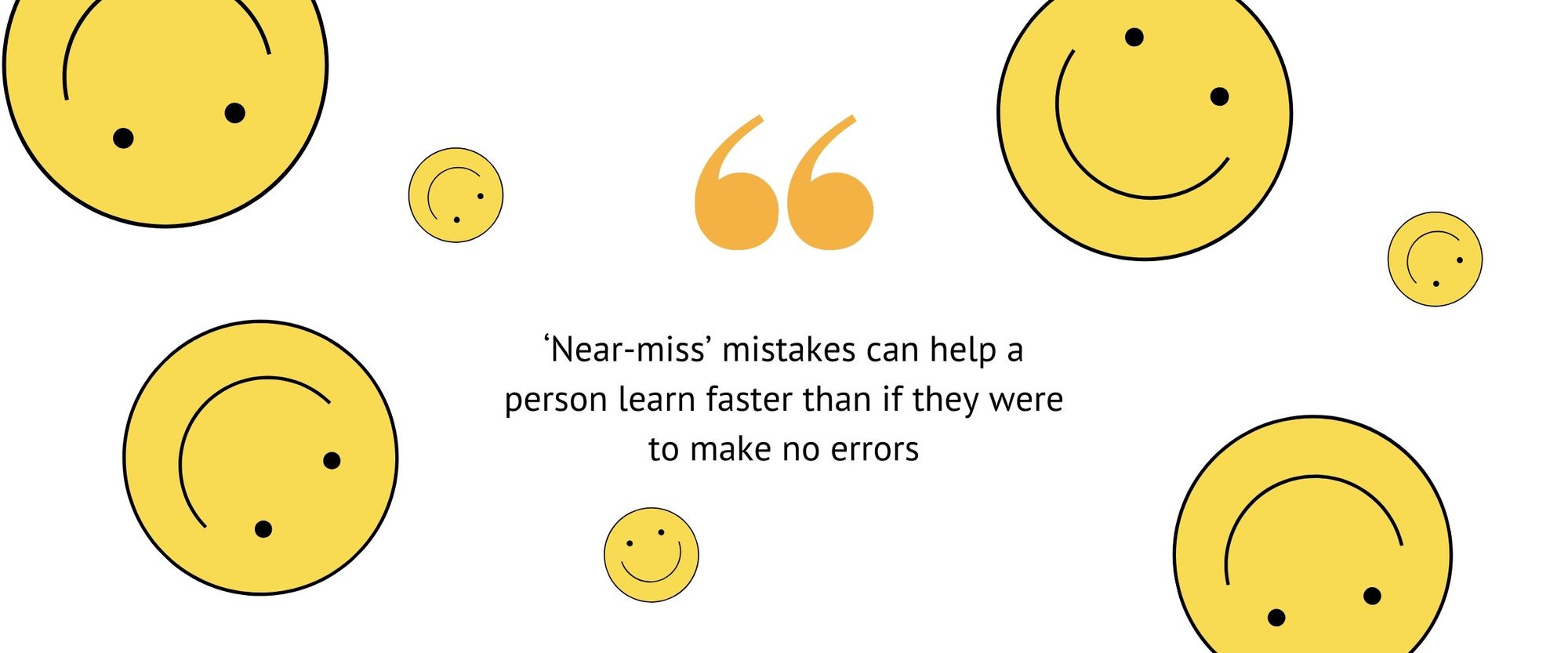Happy accidents: discover how to turn mistakes into valuable lessons
updated on Nov 10, 2022

When things go wrong, it can be tempting to throw in the towel. But before you do that, consider the ways you can turn mistakes into valuable lessons
We’re all familiar with the stomach-sinking feelings that come with the realisation that we’ve got something wrong. It could be at work, in our relationships, or out and about in the world – and big or small, these things can stick with us.
Neurologically speaking, there’s a lot going on in our brains when we put a foot wrong. In a 2018 study, neuroscientists at the California Institute of Technology traced how mistakes set off a chain reaction of brain activity and, rapidly, the brain lights up with the kind of activity that deeply encodes information.
But while the face-palming, cringing, and frustrating feelings that accompany mistakes aren’t generally pleasant, there are positives to our missteps.
“Mistakes can add huge value to our lives, and everyone has made at least one mistake in their lifetime,” says life coach Adam Craft. “Mistakes are our opportunity to grow and to gain knowledge. Many people say that they wouldn’t have been where they were in life without making mistakes. The all-important part, though, is learning from them, and understanding how to extract the positives from something that many view as a negative.”
It’s true that we need to reframe the way we feel about mistakes. In fact, a study published in the journal Memory in 2018 found that ‘near-miss’ mistakes can help a person learn faster than if they were to make no errors at all. And another study, published in the Journal of Educational Psychology, found that making deliberate mistakes – such as writing down the wrong answer to a question and then correcting it – can help improve our memory.
All that said, whether it comes from perfectionism or people-pleasing tendencies, many of us struggle in the face of our mistakes. But it doesn’t have to be that way. Have you gone wrong somewhere down the line? Follow this roadmap to turning mistakes into lessons.

Acknowledge and accept
“Sounds easy right?” Adam says. “You may feel guilty when you make a mistake, but that guilt will be a lot stronger if you don’t properly take responsibility for it. Acknowledging this to others (including yourself) will ease that guilt, helping you to start learning from your mistakes.”
For some of us, this first step might be going against our instincts. In the moment, we might look to start explaining away the mistake by diving into the ‘whys’ and ‘hows’ of its origin. We might point to a series of events, or another person, that could take the fall for us. And though this might offer us some instant relief, it might not necessarily help us move forward.
This is also an important point if you find yourself constantly returning to, and ruminating on, a mistake you made in the past. There’s nothing you can do now, so once you’ve accepted that, what should you do next?
Reframe
As Adam says, mistakes don’t have to feel negative – and learning how to reframe them in your mind can help you come to terms with them.
“Don’t punish yourself,” he advises. “So often we can beat ourselves up about making mistakes. Try putting a positive perspective on it: ‘OK, I have done this wrong, but I will learn from this and it will make me a stronger person.’ Once you learn how to reframe, you will motivate yourself to become more resilient, and will have gained knowledge.”
This is where you have to cut yourself some slack. Mistakes happen, and, at the time, they can feel devastating. We can feel as though there is no way forward, but that’s very unlikely to be the case – there will always be the next step. What that is, and how easy it is, is another matter, and requires some rumination.
Reflect
When Adam suggests you take the time to reflect on the mistake, he’s careful to point out that this isn’t about dwelling on the past. Instead, it’s about proactively taking a look at the situation, to uncover the lessons that are there.
“Ask yourself questions,” Adam says. “What went wrong? What could I do better? Did I allow myself to get distracted? Write your responses down and read them back to yourself. It is a lot easier to absorb this information when you see it written down.”
These notes can be for your eyes only. So be searingly honest with yourself. You might end up learning more than you bargained for – and then you’re ready for action.
Plan
“So, you’ve owned up to your mistake and you have reflected on it? Now you need to take action to minimise the chances of it happening again,” Adam says. “For example, if it’s a mistake at work, is there a process you could put in place? Maybe a checklist, or even extra training?”
Making those practical plans, after taking time to really absorb the situation, is where the lessons that you can take from the mistake really come into play. This is about more than just making sure that you don’t do the same thing again, and is where you can actively change your behaviour, and grow as a person.
Review
You reached the final destination on the roadmap, but did it work? What did the journey teach you? And will future pathways look different from now on?
“Maybe you feel like your knowledge has grown, or you feel like a stronger person. It’s so important to recognise your achievements,” Adam says. “As a confidence coach, I use this with my clients to help them build their self-confidence. By reviewing your successes, you are proving to yourself that you can do the things you thought you couldn’t.”
As with any self-improvement journey, the key is to have compassion for yourself. You made a mistake, and maybe you didn’t quite handle that mistake the right way – it’s easy to do – but you decided to do something about it, and that alone is commendable.
Find out more by visiting the Life Coach Directory, or speak to a qualified life coach.

